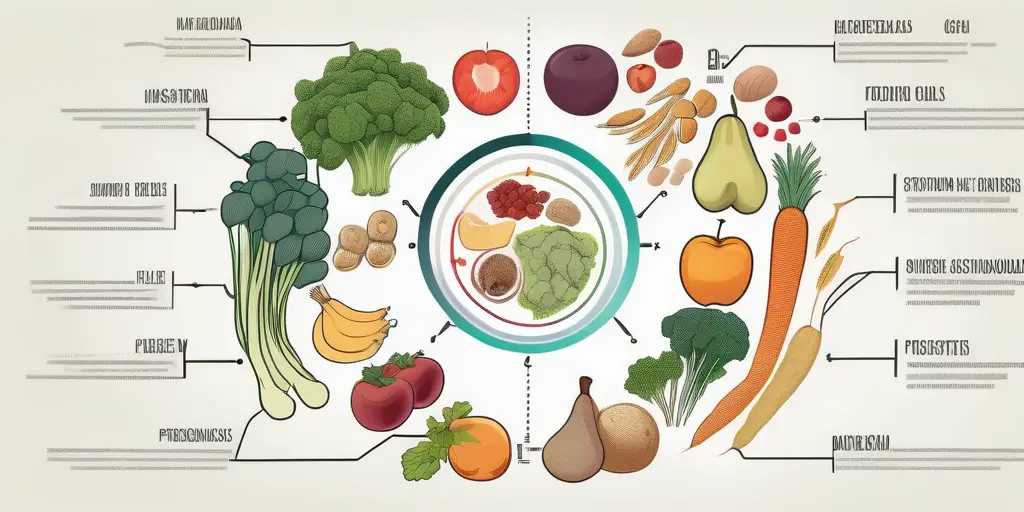The Importance of Fiber for Your Digestive Health

Fiber is an essential nutrient that plays a crucial role in supporting digestive health. It is known for its ability to promote regular bowel movements and prevent constipation. However, the benefits of fiber go beyond just aiding digestion. In this article, we will explore the various aspects of fiber and how it impacts your digestive health.
Understanding Fiber: What is it?
Before delving into the importance of fiber for digestive health, let’s first understand what fiber actually is. Fiber is a type of carbohydrate that cannot be digested by the body. Unlike other carbs, fiber passes through the digestive system relatively intact. This unique characteristic gives fiber its beneficial effects on digestion.
When we consume food, our bodies break down the carbohydrates into sugars, which are then absorbed into the bloodstream. However, fiber is different. It remains undigested as it moves through the digestive tract, providing a range of health benefits along the way.
Fiber comes from plant-based foods such as fruits, vegetables, whole grains, legumes, nuts, and seeds. It is found in varying amounts in different foods, with some being particularly rich sources of fiber. For example, raspberries, avocados, and lentils are all excellent sources of fiber.
Types of Fiber: Soluble and Insoluble
There are two main types of fiber: soluble and insoluble. Soluble fiber dissolves in water and forms a gel-like substance in the digestive tract. This type of fiber can help regulate blood sugar levels and lower cholesterol. It is found in foods such as oats, barley, beans, lentils, apples, and citrus fruits.
On the other hand, insoluble fiber does not dissolve in water. It adds bulk to the stool and helps prevent constipation. Insoluble fiber can be found in foods like whole wheat, brown rice, nuts, and vegetables such as broccoli and carrots.
Both types of fiber are important for maintaining a healthy digestive system, and it’s recommended to include a variety of fiber-rich foods in your diet to reap the benefits of both.
The Role of Fiber in the Body
Fiber plays a vital role in maintaining a healthy digestive system. It helps regulate the absorption of nutrients, speeds up the passage of food through the intestine, and promotes the growth of beneficial bacteria in the gut.
When it comes to nutrient absorption, fiber acts as a sponge, slowing down the process and allowing for better absorption of essential vitamins and minerals. This is particularly important for nutrients like calcium, magnesium, and iron.
In addition to its impact on digestion, fiber also plays a role in managing blood sugar levels. Soluble fiber, in particular, forms a gel-like substance in the digestive tract, which slows down the absorption of sugars into the bloodstream. This can help prevent spikes in blood sugar levels and is especially beneficial for individuals with diabetes or those at risk of developing the condition.
Furthermore, fiber aids in weight management. High-fiber foods tend to be more filling, which can help control appetite and prevent overeating. Additionally, fiber-rich foods often require more chewing, which can contribute to a feeling of fullness and satisfaction after a meal.
It’s worth noting that the recommended daily intake of fiber varies depending on factors such as age, sex, and overall health. However, most adults should aim for a daily intake of around 25-30 grams of fiber.
In conclusion, fiber is a crucial component of a healthy diet. It supports digestive health, helps regulate blood sugar levels, promotes the growth of beneficial gut bacteria, and aids in weight management. By incorporating a variety of fiber-rich foods into your meals, you can ensure that you are reaping the numerous benefits that fiber has to offer.
The Connection Between Fiber and Digestive Health
Research has shown that fiber has numerous benefits for digestive health. One of the key ways fiber supports the digestive system is by positively affecting the gut microbiome.
The gut microbiome is a collection of trillions of microorganisms that reside in the digestive tract. These microorganisms play a crucial role in maintaining digestive health, immune function, and overall well-being. Fiber acts as a prebiotic, providing nourishment for the beneficial bacteria in the gut. By supporting a diverse and healthy gut microbiome, fiber helps maintain a balanced digestive system.
But what exactly is fiber? Fiber is a type of carbohydrate that cannot be digested by the human body. It passes through the digestive system largely intact, adding bulk to the stool and aiding in regular bowel movements. There are two types of fiber: soluble and insoluble. Soluble fiber dissolves in water and forms a gel-like substance in the digestive tract. This type of fiber can help lower cholesterol levels and regulate blood sugar levels. Insoluble fiber, on the other hand, does not dissolve in water and adds bulk to the stool, promoting regularity.
Fiber’s Impact on the Gut Microbiome
The gut microbiome is a complex ecosystem that consists of various types of bacteria, fungi, viruses, and other microorganisms. These microorganisms work together to break down food, produce essential nutrients, and protect against harmful pathogens. Fiber acts as a fuel source for these beneficial bacteria, allowing them to thrive and carry out their important functions.
When we consume fiber-rich foods, such as fruits, vegetables, whole grains, and legumes, the fiber passes through the stomach and small intestine largely undigested. As it reaches the large intestine, it becomes a feast for the gut bacteria. The bacteria ferment the fiber, producing short-chain fatty acids (SCFAs) as a byproduct. SCFAs are essential for maintaining a healthy gut environment. They provide energy for the cells lining the colon, promote the growth of beneficial bacteria, and help regulate inflammation in the gut.
Furthermore, a diverse gut microbiome is associated with better overall health. Studies have shown that individuals with a greater variety of gut bacteria tend to have a lower risk of developing certain diseases, including obesity, type 2 diabetes, and inflammatory bowel disease. By promoting a diverse gut microbiome, fiber plays a crucial role in maintaining digestive health and reducing the risk of these conditions.
Fiber and Digestive Disorders: A Closer Look
Studies have found a correlation between insufficient fiber intake and an increased risk of developing certain digestive disorders. Conditions such as irritable bowel syndrome (IBS), diverticulosis, and hemorrhoids can be influenced by a lack of dietary fiber. Let’s take a closer look at each of these conditions:
Irritable Bowel Syndrome (IBS): IBS is a common digestive disorder characterized by abdominal pain, bloating, and changes in bowel habits. Research suggests that a low-fiber diet may contribute to the development and exacerbation of IBS symptoms. Increasing fiber intake, particularly soluble fiber, can help alleviate symptoms and improve bowel regularity in individuals with IBS.
Diverticulosis: Diverticulosis is a condition in which small pouches, called diverticula, form in the lining of the colon. These pouches can become inflamed or infected, leading to diverticulitis. A diet low in fiber is believed to be a major risk factor for diverticulosis. Fiber helps add bulk to the stool, preventing constipation and reducing pressure on the colon walls. By maintaining regular bowel movements, fiber can help prevent the formation of diverticula and reduce the risk of diverticulitis.
Hemorrhoids: Hemorrhoids are swollen blood vessels in the rectum or anus that can cause discomfort, itching, and bleeding. Straining during bowel movements, often due to constipation, is a common cause of hemorrhoids. Fiber helps soften the stool and adds bulk, making it easier to pass. By promoting regular bowel movements, fiber can help prevent and alleviate hemorrhoids.
Incorporating more fiber into the diet can have a significant impact on digestive health. It is recommended to consume a variety of fiber-rich foods, including fruits, vegetables, whole grains, legumes, and nuts. Gradually increasing fiber intake and staying hydrated can help prevent digestive discomfort that may occur when significantly increasing fiber consumption.
Daily Fiber Requirements: How Much is Enough?
Now that we understand the importance of fiber for digestive health, it’s essential to know how much fiber we should be consuming on a daily basis.
Fiber is a type of carbohydrate that cannot be digested by the body. Instead, it passes through the digestive system largely intact, providing numerous health benefits along the way. Not only does fiber promote regular bowel movements, but it also helps to lower cholesterol levels, control blood sugar levels, and maintain a healthy weight.
The recommended daily fiber intake varies depending on age and gender. For adults, the general guideline is 25-38 grams of fiber per day. This can be easily achieved by incorporating fiber-rich foods into your diet, such as whole grains, fruits, vegetables, legumes, and nuts.
Children and teenagers have slightly lower requirements, ranging from 19-31 grams per day. It’s crucial for parents and caregivers to ensure that young individuals are getting enough fiber in their diets to support their growing bodies and promote healthy digestion.
Fiber Intake Recommendations for Different Ages
Meeting the recommended daily fiber intake is essential for maintaining optimal digestive health. However, it’s important to note that individual needs may vary based on factors such as activity level, overall health, and specific dietary requirements.
For infants, the introduction of solid foods should include fiber-rich options like pureed fruits, vegetables, and whole-grain cereals. As they transition into toddlerhood, their fiber needs increase to support their growing bodies.
During adolescence, when rapid growth occurs, it’s crucial to ensure that teenagers are consuming enough fiber to support their overall health and development. Encouraging them to choose whole-grain bread, pasta, and cereals over refined options can help meet their fiber requirements.
Signs You’re Not Getting Enough Fiber
Not getting enough fiber in your diet can lead to various digestive issues. Common signs of insufficient fiber intake include constipation, bloating, and irregular bowel movements. If you experience these symptoms, it may indicate a need to increase your fiber consumption.
Constipation is a common problem that can be caused by a lack of fiber in the diet. Without enough fiber, the stool becomes hard and difficult to pass, leading to discomfort and strain during bowel movements. Increasing fiber intake can help soften the stool and promote regularity.
Bloating is another symptom that may occur when fiber intake is inadequate. Fiber helps to regulate digestion and prevent the buildup of gas in the intestines. When there is a lack of fiber, gas can become trapped, leading to bloating and discomfort.
Irregular bowel movements, characterized by infrequent or unpredictable trips to the bathroom, can also be a sign of insufficient fiber intake. Fiber adds bulk to the stool, making it easier to pass. Without enough fiber, the stool may become small and hard, resulting in irregularity.
Incorporating fiber-rich foods into your diet, such as whole grains, fruits, vegetables, legumes, and nuts, can help alleviate these symptoms and promote a healthy digestive system.
Incorporating More Fiber into Your Diet
Increasing your fiber intake doesn’t have to be challenging. With some strategic dietary adjustments, you can easily include more fiber-rich foods in your meals.
Fiber is an essential nutrient that plays a crucial role in maintaining a healthy digestive system. It helps regulate bowel movements, prevents constipation, and can even lower the risk of developing certain chronic diseases, such as heart disease and diabetes.
When it comes to incorporating more fiber into your diet, there are numerous delicious and nutritious options to choose from. Whole grains, such as oats and quinoa, are excellent sources of fiber. They not only provide a satisfying texture but also offer a range of other essential nutrients, including vitamins, minerals, and antioxidants.
Legumes, such as lentils, chickpeas, and black beans, are another fantastic source of fiber. They are not only packed with fiber but also rich in protein, making them an excellent choice for vegetarians and vegans looking to increase their fiber intake.
Fruits and vegetables are also high in fiber and offer a wide variety of flavors and textures. Berries, apples, pears, broccoli, and carrots are just a few examples of fiber-rich produce that can easily be incorporated into your meals and snacks.
Additionally, nuts and seeds, such as almonds, chia seeds, and flaxseeds, are not only a great source of fiber but also provide healthy fats and other essential nutrients. Sprinkling them on top of salads, yogurt, or oatmeal can add a delightful crunch and boost your fiber intake.
High-Fiber Foods to Include in Your Meals
There are many delicious and nutritious foods that are excellent sources of fiber. Whole grains, such as oats and quinoa, legumes, fruits, vegetables, and nuts and seeds, are all high in fiber. By incorporating these foods into your diet, you can boost your fiber intake while enjoying a variety of flavors and textures.
Whole grains, such as brown rice, whole wheat bread, and whole grain pasta, are not only rich in fiber but also provide a good amount of vitamins, minerals, and antioxidants. They can be easily substituted for refined grains in your favorite recipes, adding a nutty flavor and satisfying chewiness.
Legumes, including lentils, black beans, and chickpeas, are not only high in fiber but also a great source of plant-based protein. They can be used as a base for soups, stews, and salads, or mashed into spreads like hummus.
Fruits and vegetables are naturally high in fiber and offer a wide range of health benefits. Berries, such as raspberries, blackberries, and strawberries, are particularly rich in fiber and antioxidants. Leafy greens, like spinach and kale, are also excellent sources of fiber and provide a variety of vitamins and minerals.
Nuts and seeds are not only a convenient snack but also a great way to add fiber to your diet. Almonds, walnuts, chia seeds, and flaxseeds are all high in fiber and can be enjoyed on their own or added to smoothies, baked goods, or salads.
Tips for Increasing Fiber Intake Gradually
Gradually increasing fiber intake is essential to avoid digestive discomfort. Start by adding small amounts of fiber-rich foods to your meals and gradually increasing the portion sizes. It’s also crucial to drink plenty of water as you increase your fiber intake to help move fiber through the digestive system smoothly.
When increasing your fiber intake, it’s important to listen to your body and make adjustments accordingly. Some individuals may experience bloating or gas when consuming too much fiber too quickly. If this happens, try reducing the portion sizes or opting for cooked vegetables instead of raw ones, as they can be easier to digest.
In addition to incorporating fiber-rich foods into your meals, consider swapping out refined grains for whole grains whenever possible. Choosing whole wheat bread over white bread or brown rice instead of white rice can significantly increase your fiber intake.
Another way to boost your fiber intake is to include more plant-based meals in your diet. Plant-based diets, such as vegetarian or vegan diets, tend to be naturally high in fiber due to the abundance of fruits, vegetables, legumes, and whole grains they include.
Overall, increasing your fiber intake can have numerous health benefits, including improved digestion, increased satiety, and better blood sugar control. By incorporating a variety of fiber-rich foods into your meals and making gradual adjustments, you can easily meet your daily fiber needs and enjoy a more balanced and nutritious diet.
Potential Risks of Excessive Fiber Intake
While fiber offers numerous benefits, consuming excessive amounts of fiber can have some downsides as well.
Understanding Fiber Supplements: Pros and Cons
Fiber supplements can be beneficial for individuals who struggle to meet their daily fiber requirements through diet alone. However, it’s essential to choose supplements wisely and monitor intake. Taking too much fiber in supplement form can lead to bloating, gas, and even nutrient malabsorption.
When Too Much Fiber Becomes a Problem
In some cases, excessively high fiber intake can cause digestive issues, such as diarrhea or abdominal discomfort. It’s important to listen to your body and find the right balance of fiber that works for you.
The Future of Fiber: Emerging Research and Insights
As the field of nutrition continues to evolve, researchers are constantly uncovering new insights into the potential health benefits of fiber.
Fiber and Its Potential Role in Disease Prevention
Emerging research suggests that fiber may play a role in reducing the risk of various chronic diseases, including heart disease, type 2 diabetes, and certain types of cancer. Scientists are still investigating the mechanisms behind these potential benefits, but this highlights the importance of fiber for overall health.
The Evolving Understanding of Fiber’s Health Benefits
Our understanding of fiber’s health benefits is continuously evolving. While we have long known about fiber’s impact on digestion, recent studies have shed light on its potential effects on inflammation, mood, and even brain health. As research progresses, we can expect even more discoveries in the exciting field of fiber and its impact on our health.
In conclusion, fiber is a vital nutrient for maintaining optimal digestive health. Its benefits extend beyond regular bowel movements, impacting the gut microbiome, reducing the risk of digestive disorders, and supporting overall well-being. By understanding the different types of fiber, meeting our daily requirements, and incorporating fiber-rich foods into our diets, we can take proactive measures to improve our digestive health and enhance our overall quality of life.

